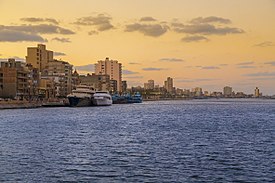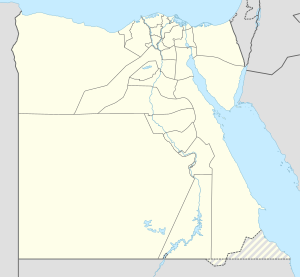Rosetta
رشيد Rashid | |
|---|---|
Clockwise from top: Rashid Corniche, dome of the St. Mark Church, a street in the old town, Abbasi Mosque, and fishing. | |
 Location in Beheira Governorate | |
| Coordinates: 31°24′16″N 30°24′59″E / 31.40444°N 30.41639°E | |
| Country | Egypt |
| Governorate | Beheira |
| Area | |
• Total | 196.6 km2 (75.9 sq mi) |
| Elevation | 2 m (7 ft) |
| Population (2021)[1] | |
• Total | 301,795 |
| • Density | 1,500/km2 (4,000/sq mi) |
| Time zone | UTC+2 (EET) |
| • Summer (DST) | UTC+3 (EEST) |
Rosetta (/roʊˈzɛtə/ roh-ZET-ə)[a] or Rashid (Arabic: رشيد, romanized: Rašīd, IPA: [ɾɑˈʃiːd]; Coptic: ϯⲣⲁϣⲓⲧ, romanized: ti-Rashit)[b] is a port city of the Nile Delta, 65 km (40 mi) east of Alexandria, in Egypt's Beheira governorate. The Rosetta Stone was discovered there in 1799.
Founded around the 9th century on the site of the ancient town of Bolbitine, Rosetta boomed with the decline of Alexandria following the Ottoman conquest of Egypt in 1517, only to wane in importance after Alexandria's revival. During the 19th century, it was a popular British tourist destination, known for its Ottoman mansions, citrus groves and relative cleanliness.
Cite error: There are <ref group=lower-alpha> tags or {{efn}} templates on this page, but the references will not show without a {{reflist|group=lower-alpha}} template or {{notelist}} template (see the help page).






